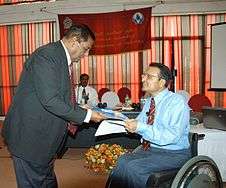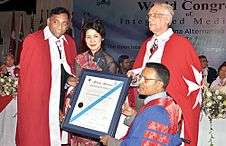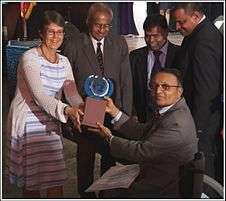Ajith C. S. Perera
| Ajith C. S. Perera | |
|---|---|
|
Perera (in February 2009) | |
| Born |
29 February 1956 Galle, Sri Lanka (earlier Ceylon) |
| Nationality | Sri Lankan |
| Education |
Royal College Colombo, University of Sri Lanka-Colombo, University of Birmingham – England |
| Occupation |
Chartered Chemist, Former Test Cricket Umpire, Former senior manager, Disability activist Accessibility adviser Accessibility auditor Chief executive IDIRIYA |
| Parent(s) |
Commander M. G. S. Perera, Maureen Johanna Perera |
Ajith Chrysantha Stephen Perera, JP, CChem., FRSC (born 29 February 1956) is a Chartered Chemist by profession, a scholar, a former senior manager in industry, a qualified training instructor, also a former test-match-panel cricket umpire.[1][2][3] Today he is a writer, speaker, author, a disability rights activist and accessibility adviser-accessor serving humanity, befittingly recognised by three learned societies and several reputed bodies overseas.[4]
The international admiration Perera has won and the national recognition he has gained have come through his achievements, acquired both in Sri Lanka and in England in different fields: cricket, analytical chemistry and quality assurance, in all of which he is academically and professionally well qualified and widely experienced.[5][6]
Almost on the eve of umpiring his first cricket test match in Colombo, Sri Lanka vs New Zealand, a large wayside tree crashed on and straddled his moving car, killing his chauffeur and leaving him instantaneously a paraplegic for life.[5][7][8][2]
He is the founder and, as of 15 December 2016, holds the honorary position of Chief Executive / Secretary-General of Idiriya, a registered, not-for-profit humanitarian service organisation in Sri Lanka.
Family
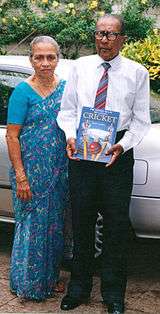
Born to Instructor Commander M. G. S. Perera, former Director of Naval Training, Royal Ceylon Navy[9] and former Senior Staff Captain / Nautical Instructor (Training of Deck Officer Cadets) Ceylon Shipping Corporation (1977–1983)[10] and Maureen Johanna Perera, he has one sister, Deepthi C. J. Guneratne BSc(Botany), MSc(Soil Chemistry).
Education
Perera completed his primary and secondary education at the Royal Primary School and the Royal College, Colombo and thereafter gained BSc(Honours) from the University of Sri Lanka, Colombo in May 1975,[3] followed by a joint MSc from the University of Colombo and the University of Birmingham, England in July 1977. He thereby qualified professionally in the field of Analytical Chemistry,[11] specialising in the subject of Quality Assurance, in which he holds an honorary PhD
Professional life: 1978–1992
Perera is a Chartered Chemist by profession and a Registered Analytical Chemist[12][13] of the Royal Society of Chemistry (RSC) in the United Kingdom. He is a Fellow (FRSC) of the RSC of which he is an honorary life member and the former hony. secretary / treasurer (1984–1992) of its section in Sri Lanka.
He is also a life member and a Fellow (FIChemC) of the Institute of Chemistry Ceylon[14][15] and a Fellow (FIQA) of the Institute of Quality Assurance UK,.
His professional career started in August 1978 as an assistant lecturer at the department of Chemistry, University of Colombo. His work thereafter in the multinational pharmaceutical manufacturing industry extended for almost 14 years, from September 1978 until July 1992.
Perera started his career in industry as a production executive with Glaxo Ceylon Limited and stayed until March 1982.
Mackwoods-Winthrop Limited then hired hm as the senior manager in charge of their quality assurance and analytical control divisions until March 1989, and thereafter as the senior manager of the newly established technical services department.[16]
Perera then changed over to the cosmetics and healthcare industry when Hemas Manufacturing Limited invited him to join them in August 1992 as the Director-Senior Manager of quality assurance and product development.
But it was only 14 weeks service there for Perera, as a freak road accident on 12 November 1992 made him instantaneously a paraplegic for life and cut short tragically, at the age of 36, his professional career that was just blossoming out.[5]
Cricket career: 1972 –
His professional achievements in the cricketing sphere have extended to almost all possible vital avenues of the game reaching often the professional levels – as a player, umpire, scorer, training instructor and examiner on its laws, administrator, writer, author, and even an activist promoting 'enabling facilities for all' at cricket stadia, etc.[17]
Major Achievements
Perera started playing serious cricket, as a utility player who combined his undergraduate and postgraduate education with cricket. He represented regularly the University of Colombo for seven consecutive years between 1972 and 1978, and played at Inter-club Division – One two-day tournament cricket[5][6] conducted by the Board of Control for Cricket in Sri Lanka (BCCSL) for the P. Saravanamuttu Trophy, which was then considered as the main first-class domestic cricket competition in the country.[18]
In 1975, whilst still an undergraduate, Perera qualified to become a cricket umpire. He is the first and only test-match-panel Cricket Umpire the Royal College Colombo and the University of Colombo have ever produced.[6]
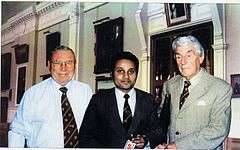
Sri Lanka gained test status in 1981 as a full member of the international cricket council. Yet, it was still the era when cricket scoring was hardly given any kind of importance.
In the Preface to The Golden Era of Sri Lankan Cricket Leslie Cheeseman B.E.M. described Perera's endeavours as:[19]
"Even in those early days, the perceived extent of his unbridled enthusiasm, the level of his intended personal commitment, analytical mind, high degree of technical knowledge of the game and its governing laws, plus his unquenchable thirst for newer knowledge and practical experience at higher level of the game together with his willingness to further improve individual performance, made Perera to decide to go to England, several times at his own expense, to achieve this goal".
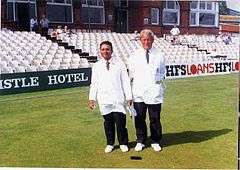
As a result, Perera became the First Sri Lankan to be accepted and recognised by the body the Association of Cricket Umpires and Scorers England as a "professionally qualified" cricket umpire (24 October 1985),[7] scorer (7 April 1987), then also as a 'scorer competent in advanced scoring techniques' (25 March 1990), a Grade – A senior training instructor in the art and craft of both cricket scoring and cricket umpiring (August 1990) and finally, also as an effective examiner (1 November 1998) on the Laws of Cricket, all offices of this reputed association.[2][5]
For 15 weeks of the British summer in 1990, Perera, afforded the opportunity, umpired matches in England in Lancashire county four-day second eleven and in leagues in the area, viz. Bolton & District Cricket Association, Bolton League and Central Lancashire.[5]

After 17 years of hard work, sacrifice, loads of patience and, refusal to bow down to pressure and change his ways to please anyone at the centre, Perera, at the age of 36, made his way to the six-member Sri Lanka test-match-panel of cricket umpires on 10 November 1992. [2][20]
In 10 days’ time Perera was due to stand in his first test match in Colombo Sri Lanka vs New Zealand. It was so…… very close yet so far for Perera.[17]
Significant Contributions
In 1996, he was highly commended by the then Sri Lanka Cricket Board in becoming of great assistance to them, as single-handedly, Perera accepted and satisfactorily completed its highly technical assignment to streamline the rules and regulations governing 2, 3 and 4-day division – 1, division – 2 and under 24 major tournament cricket in Sri Lanka. [21]
Seated on a wheelchair, battling paraplegia and balancing a laptop, he authored two A-4 size internationally famed books on cricket, The Golden Era of Sri Lankan Cricket (May 1999) ISBN 955-96698-0-X and Thinking Cricket (September 2001) ISBN 955-96698-1-8. They were also published by him without any external financial support.[5]

In December 1999, at the request of the Sri Lanka Cricket Board, Perera designed and conducted over four half-days the first formal training and evaluation programme for the top Sri Lanka scorers, in preparation for the under-19 cricket world cup tournament that was held there in January 2000. [2][22]
Perera has also turned a pioneer disability activist campaigning in Sri Lanka for enabling sports environments and user-friendly facilities.[23]
Honours and Recognitions
On 8 May 1999 the Association of Cricket Umpires Sri Lanka, in recognition of his twenty four long years of dedicated services, unstinted loyal support and unlimited contributions towards the betterment of the umpiring fraternity in Sri Lanka, at times at great personal sacrifice, unanimously elected Perera a ‘Life Member’. [24]
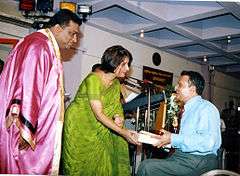
Wisden Cricketers’ Almanack (millennium edition) has seen fit to regard Perera as one of only eight cricketing people to be specifically recognised for his many achievements and worthwhile contributions to the game.[3][5]
He also became a recipient (1999) of the star of Asia award for excellence in sports.[8]
On 30 January 2003, Perera and 15 other retired test match and one-day international panel senior umpires of Sri Lanka were recognised for the dedicated long years of thankless services rendered to the game and felicitated.[25][26]
On 30 September 2005, Perera, for his internationally recognised significant contributions to cricket literature, became the first author in the annals of his country's sports literature to be recognised and honoured formally at a literary awards festival. [27][5][28]
On 30 August 2007 again, Perera was amongst five cricket scorers recognised and honoured befittingly for the untiring and admirable services rendered to this vital aspect of the game.[29][2]
dis-Ability Activist: 1997 –
Perera is a pioneer campaigner in Sri Lanka for Social Inclusion focusing equal opportunity, justice and dignity for People of ALL Abilities in day-to-day life – the key concept in this context being universal design for inclusion of people.- (meaning construction of environments that enable so as to include all and exclude none.) [30]
Significant Contributions
As a disability rights activist, Perera has promoted the concept of establishing a society that does not marginalise or discriminate against people on the basis of limited mobility, either for short time, or long time or life time in attending to normal day-to-day life – the principal problem in this context.[31]

He is a fervent advocate of built environments and facilities that are a joy rather than a trial to use by everyone. He has constantly used the weapon of persuasion to convince people that the cumulative result of even small changes could be substantial.[32]
Perera has also pioneered the campaign in Sri Lanka for accessible tourism, recognising it as an overlooked growth market and new profit resource for Sri Lanka.[33]
Perera was also instrumental in proposing to the Sri Lanka Standards Institution (SLSI) and paving the way in persuading them to establish the first Sri Lanka standard for design in building construction SLS ISO TR 9527:2006 in 2007,[34] a fact which Dr. A. R. L. Wijesekera, the then Chairman SLSI, recognised as an achievement of national importance.[35]
Major Achievements
Perera successfully pursue single handed a fundamental rights application.
Perera, appearing at all times in person on a wheelchair and seeking redress for physically disabled persons accessing new public buildings, successfully pursued single handed a public interest litigation fundamental rights application under reference SCFR 221/2009.[40]
He argued the need to have the disability access laws and regulations already enacted some years ago, fully enforced and implemented from this date, so that, ALL Key Building Parts of NEW public buildings in Sri Lanka – toilets and wash facilities in particular – in the commercial, recreational, social, educational, residential and industrial categories, shall be constructed in accordance with standards and design requirements specified in the regulations.[41]
His endeavours were aimed at minimising safety hazards for everyone, preventing further colossal losses the people and country incur, promoting social exclusion for all and enhancing productive and gainful opportunities for the widest possible range of persons, dis-abled persons in particular, in their day-to-day lives.
Perera gets a fillip for accessibility rights
Thanks to the commitment and voluntary efforts of Perera with foresight, the inherent right of dis-Abled persons to have unhindered access to public buildings and facilities received a substantial boost when the Supreme Court of Sri Lanka gave a landmark order on 27 April 2011, further strengthening the earlier given order of 14 October 2009.[42]
The Supreme Court order, Perera ensured, further stated that all authorities empowered to approve building plans or issue ‘Certificates of Conformity’ for public buildings shall refrain from doing so in respect of any new buildings which violated these orders.
Building planners, architects, builders and local authorities together with owners and co-owners, as equally responsible partners, will be required to adhere to the legal requirements in regard to accessibility. Any violations of these court orders shall be a serious punishable offence incurring punitive repercussions.
Perera for the petitioner present again in person saw the Supreme Court of Sri Lanka order on 17 June 2013 the Agencies of the State to ensure that those of them who are disabled or with restricted ability be given every opportunity to integrate freely with the community.[43]
At the Presidential Elections held on 26 January 2010, Perera, in consultation with the Commissioner of Elections initiated voluntary action[44] towards enabling the staff on duty at polling stations to be sensitive to the special needs of dis-Abled voters, including those with significant physical, manual and visual impairments and worked towards providing polling stations and polling booths that would be more approachable and accessible to the dis-Abled persons.[45][46]
For the first time in Sri Lanka history, with endeavors to make hear their voices in the Parliament, Perera led a group of professionals and intellectuals with restricted ability to contest the Parliamentary Elections of 17 August 2015.[47][48][49]
Honours and Recognitions
As depicted in the five photographs below, Dr. Perera perhaps became the first person with dis-Abilities in Sri Lanka to be recognised in Sri Lanka for his outstanding voluntary contributions to the community – to the promotion and establishment of 'Accessibility to the Built Environment', enhancing safety and social inclusion with empowerment of people with all abilities.
Perera has aggressively promoted in Sri Lanka the concept of 'Social Inclusion for All' with the Vision: Accessible Sri Lanka focusing on built environments that does not marginalise or cause discrimination against people on the grounds of inevitable diversity in ability and campaigned against arbitrary categorisation of people.[31]
Undeterred by his personal adversity, playing eight different roles over 17 consecutive years for the promotion of Accessibility Rights in Sri Lanka, he was recognised and appreciated. First, in September 2016, he was named the "Sri Lankan of the Year 2016" under the category of Unsung Hero; and then on the UN Day in October 2016 he was presented with the APEX award by the United Nations Association of Sri Lanka.
|
Books Published
The Golden Era of Sri Lankan Cricket
- (1999 April); ISBN 955-96698-0-X
It's an impressive memento which described the fascinating story of how his national team – Sri Lanka – blossomed out and established itself as International Champions of 1996/97 in Overs-limited cricket. Perera has also captured here the brilliance, the philosophy and the pulsating drama of one-day internationals (ODIs) of that glorious period (1996–98) backed by highly informative and well tabulated appendices.[57]
- Further Reading
- Sri Lanka were the Kings amongst Kings (1996–99) Retrieved on 27 February 2009
- Another masterpiece by Ajith Perera Retrieved on 27 February 2009
Thinking Cricket
- (2001 September); ISBN 955-96698-1-8 Magnum opus
Perera's Magnum opus never loses sight of what is required to make a complete cricketer – in every sense of the word. Former England skipper Mike Brearley OBE has contributed the preface while the then Sri Lanka's cricket coach, Davenall Whatmore, the Foreword. It is the only self study training guide by an umpire for the players. It has won admiration and gained much recognition to the country from the cricketing world, which includes the ICC, MCC, ECB and even the prestigious Wisden Cricketers’ Almanack (2002).[58][59]
- Further Reading
- Thinking Cricket (February 2004) Retrieved on 12 March 2009
- This is no ordinary cricket book but a well-thought out book of instructions. By Mahinda Wijesinghe (2001 November) Retrieved on 12 March 2009
Access Ability for All – Why You?
- (2008 May); ISBN 978-955-1914-00-4
It is an A-5 size consciousness-raising mind opener, free of technical jargon, on Accessibility for All to built environments to convince decision makers that it is a low cost investment and a Win – Win game of indispensable National importance for everyone.[60]
Teacher to the Navy – Instructor Commander M. G. S. Perera
- (2004 August); ISBN 955-96698-2-6
This book is a tribute to Perera's father, who served Sri Lanka's Navy in its formative years (1950–1975) and founded the Naval and Maritime Academy (NMA) at Dockyard Trincomalee on 18 July 1967, serving as its first commandant.[9] See under External links
Notes
- ↑ Chandrarathne, Ranga (2 April 2006). "Designing to add years to life". Features Page 35. Sunday Observer. Retrieved 2009-01-02.
- 1 2 3 4 5 6 Withington, Neil (1 September 2007). "Historic Occasion in Sri Lanka – Editor's Comments". Journal of the Association of Cricket Umpires and Scorers. Surrey, England: The Association of Cricket Umpires and Scorers England (310): 21.
- 1 2 3 Perera, S. S. (5 March 2001). Battle of the Blues Royal Thomian Cricket Encounter 2001 Royal Souvenir – "An appreciation of a distinguished Royalist, a professional and a cricket enthusiast". Royal College Colombo. Retrieved 2009-01-02.
- ↑ "Voices unheard in Parliament". Features – Guest Column Daily Financial Times Page 17. Wijeya Newspapers. 5 December 2016. Retrieved 2016-12-10.
- 1 2 3 4 5 6 7 8 9 Thawfeeq, Sa’adi (18 February 2007). "Paraplegic Ajith campaigns for equality to all". Sports. The Nation on Sunday. Retrieved 2009-01-02.
- 1 2 3 Wijedasa, K. L. F. (16 April 2007). "Signed Official Document". By:Former Director of Physical Education, University of Colombo (1965–1982); Former Member Sri Lanka Sports Council, Former Chairman, National Selection Committee; Former National Athletic Coach.
- 1 2 Veera, Sriram (29 January 2009). "Retired hurt but not out". Cricinfoblogs Tour Diary India in Sri Lanka 2009. Cricinfo. Archived from the original on 2 February 2009. Retrieved 22 January 2017.
- 1 2 Briggs, Simon; Tanya, Aldred (4 April 2000). Matthew, Engel, ed. Wisden Cricketers’ Almanack 2000 (137 ed.). Guildford Surrey: John Wisden & Co. Limited. p. 1533. ISBN 0-947766-57-X.
- 1 2 Weliwitigoda M. H., Lieutenant Commander SLN. (Rtd.), Instructor Commander M. G. S. Perera – the founder of the Naval Academy, retrieved 2012-05-10
- ↑ Perera, Ajith C. S. (10 August 2004). Teacher to the Navy – Instructor Commander M. G. S. Perera (First ed.). Colombo: The Compiler. pp. IV & XI. ISBN 955-96698-2-6.
- ↑ "What is Analytical Chemistry?". Retrieved 2009-02-20.
- ↑ "Formal certificate issued by the Royal Society of Chemistry in the U.K. signed by President and Registrar". RSC. 1 April 1999.
- ↑ "Who is an Analytical Chemist?". Retrieved 2009-02-20.
- ↑ "What is The Institute of Chemistry, Ceylon?". Archived from the original on 5 February 2009. Retrieved 2009-02-21.
- ↑ "Who is a Fellow of The Institute of Chemistry, Ceylon?". Archived from the original on 5 February 2009. Retrieved 2009-02-21.
- ↑ Teresa Harris, (Editor) (1 July 1991). "News of Members". Quality News – the Magazine of the Institute of Quality Assurance London. London: IQA. 17 (7): 295.
- 1 2 Rodrigopulle, Elmore (22 May 2007). "Enabling environments". Sports Page 40. Daily News. Retrieved 2009-01-28.
- ↑ Balachandran Kanishkaa, (editorial assistant of Cricinfo) (5 October 2006). "Cricinfo Sri Lanka domestic cricket – A brief history". Cricinfo. Cricinfo. Archived from the original on 18 February 2009. Retrieved 2009-02-04.
- ↑ Perera, Ajith C. S.. (18 April 1999). The Golden Era of Sri Lankan Cricket (first ed.). Colombo: author. pp. IX–XI. ISBN 955-96698-0-X.
Preface.
- ↑ Gunaratne, Tissa (11 November 1992). "Signed Official Document". By: The then Administrative Secretary Board of Control for Cricket in Sri Lanka.
- ↑ Bernadus, Carlton (26 August 1996). "Signed Official Document". By: The then Chairman of Tournament Committee of the Board of Control for Cricket in Sri Lanka.
- ↑ Perera, Ajith C. S. (18 September 2001). Thinking Cricket (first ed.). Colombo: Author. p. 257. ISBN 955-96698-1-8.
- ↑ Perera, Ajith C. S. (19 August 2008). "Cricket where Everybody is Included – "An investment for a better tomorrow"". Features Page 8. Upali Newspapers – The Island. Retrieved 2009-01-30.
- ↑ Amarasinghe, Saman (8 May 1999). "Signed Official Document". By: The then Hony. General Secretary of the Association of Cricket Umpires Sri Lanka.
- ↑ Fernando, R. L. (17 January 2003). "Janashakthi Insurance the first to felicitate our retired cricket umpires". Sports Page 18. Upali Newspapers – The Island. Retrieved 2009-01-08.
- ↑ "Historic occasion for cricket umpires" (Press release). Upali Newspapers – The Island. 4 February 2003. Retrieved 2009-01-24.
- ↑ "Ajith Perera to be honoured today" (Press release). Daily News. 30 September 2005. Retrieved 2009-01-23.
- ↑ "Recognition given to sports literature" (Press release). Daily News. 4 October 2005. Retrieved 2009-01-23.
- ↑ "Historic occasion for Lanka cricket scorers" (Press release). Lake House – Daily News. 30 August 2007. Archived from the original on 4 June 2011. Retrieved 2009-01-30.
- 1 2 Chandrarathne, Ranga; Thilakarathne, Indeewara (25 November 2007). "Universal accessibility a modern prerequisite". Plus – Features. Lake House – Sunday Observer. Retrieved 2009-01-22.
- 1 2 Ockersz, Lynn (27 March 2006). "Disability no dead-end". Features, OP-ED Page. Lake House – Daily News. Archived from the original on 11 January 2007. Retrieved 2009-02-02.
- 1 2 Ockersz, Lynn (25 November 2007). "Brimming possibilities in the dis-abled". Features, Volume 29, Issue 47. Upali Newspapers – Sunday Island. Retrieved 2009-02-02.
- ↑ Perera, Ajith C. S.. (4 May 2008). Access Ability For All – Why You (first ed.). Colombo: IDIRYA. pp. 135–139. ISBN 978-955-1914-00-4.
- ↑ "Design to include, not exclude, all people" (Press release). Organisation of Professional Associations (OPA). 29 November 2007. Archived from the original on 4 June 2011. Retrieved 2009-03-15.
- ↑ Perera, Ajith C. S. (4 May 2008). Access Ability For All – Why You? (first ed.). Colombo: IDIRYA. p. 111.
- ↑ "'Access for all'" (Press release). HSBC Sri Lanka – The Sunday Leader. 3 August 2008. Retrieved 2009-02-25.
- ↑ Kuruwita, Rathindra (30 November 2008). "Enabling environments for all". News – Features – Page 12. Rivira Media Corporation – The Nation on Sunday. Retrieved 2009-03-14.
- ↑ "'Astron in laudable CSR project'" (Press release). Astron Limited Ratmalana – The Sunday Observer. 4 February 2007. Retrieved 2009-02-21.
- ↑ "'Accessible facilities at Parliament'" (Press release). Sri Lanka Parliament – The Island. 22 January 2009. Retrieved 2009-03-03.
- ↑ "Chartered Chemist goes to Supreme Court". News – Page 2. Wijeya Newspapers – The Sunday Times. 26 April 2009. Retrieved 2010-01-20.
- ↑ "Supreme Court order propels ‘accessibility for all’". Features – Page 16. Associated Newspapers of Ceylon Limited – Daily News. 13 November 2009. Archived from the original on 4 June 2011. Retrieved 2010-01-24.
- ↑ Ockersz, Lynn (8 November 2009). "Landmark Supreme Court ruling – A fillip for accessibility rights of disabled.". News – Page 17. Upali Newspapers – The Sunday Island. Retrieved 2010-01-26.
- ↑ Rutnam, Easwaran (4 August 2013). "A Fight For Equal Access". Focus – Page 16. Leader Newspapers – The Sunday Leader. Retrieved 2013-08-08.
- ↑ Dissanayake, Dayananda. (8 January 2010). "Signed Official Reply Letter". Commissioner of Elections.
- ↑ "‘Enabling elections for disabled persons’". Features – Page 34. Associated Newspapers of Ceylon Limited – Daily News. 23 January 2010. Retrieved 2010-01-28.
- ↑ "‘Accessible polling booths for enabling elections’". News – Page 14. Wijeya Newspapers – Sunday Times. 17 January 2010. Retrieved 2010-01-27.
- ↑ A Group of professionals with ‘Restricted Ability’ contest Parliamentary Elections. Sunday Times – 2, Retrieved on 25 December 2015
- ↑ Dr. Perera laments political apathy towards the disabled. Daily FT, Retrieved on 24 December 2015
- ↑ +Our voices have to be heard in Parliament – Dr. Ajith Perera. Sunday Times, Retrieved on 25 December 2015
- 1 2 "Press Release by D.O.J.F. ‘Disability activist Dr. Ajith C. S. Perera felicitated’". The Island – Upali Newspapers Colombo 13. Retrieved 2012-05-05.
- 1 2 3 "Press Release by OIUCM ‘International recognition for activist.’". Sunday Times – Wijeya Newspapers Colombo 02. Retrieved 2012-05-07.
- ↑ "Press Release by HRCSL ‘HRCSL's gratitude and sincere thanks to Dr Ajith Perera.’". Financial Times – Wijeya Newspapers Colombo 02. Retrieved 2012-05-10.
- ↑ "Dr. Ajith Perera receives UNASL APEX Award". Sunday Times Plus Page 9. Wijeya Newspapers of Sri Lanka. 6 November 2016. Retrieved 2016-12-10.
- ↑ "Accessibility Rights Activist Dr. Ajith Perera wins UNASL APEX Award". Daily Financial Times Page 4. Wijeya Newspapers of Sri Lanka. 24 October 2016. Retrieved 2016-12-09.
- ↑ "Dr. Ajith Perera Unsung Hero crowned at Sri Lankan of the Year 2016". Features Daily Financial Times Page 15. Wijeya Newspapers. 27 September 2016. Retrieved 2016-12-10.
- ↑ "Dr. Ajith C. Perera adjudged "The Unsung Hero"". News Daily News Page 2. Associated Newspapers of Sri Lanka. 26 September 2016. Retrieved 2016-12-10.
- ↑ Wright, Graeme (1 May 2000). Cricket Books, 1999. Wisden Cricketers’ Almanack 2000. Guildford, Surrey, England: John Wisden & Co. Limited. pp. 1501–1502. ISBN 0-947766-57-X.
- ↑ Wright, Graeme (5 May 2003). Cricket Books, 2001. Wisden Cricketers’ Almanack 2002. Guildford, Surrey, England: John Wisden & Co. Limited. pp. 1535–1536. ISBN 0-947-76670-7.
- ↑ "' Historic occasion for cricket umpires'" (Press release). Sport Desk – The Island. 6 February 2003. Retrieved 2009-03-03.
- ↑ Abayasekara, Anne (4 June 2008). "Access Ability For All. Why You?". Midweek Review. Upali Newspapers – The Island. Retrieved 2009-03-15.
References
- "Ajith's World of Cricket". Cricket Website. Retrieved 2009-02-20.
- Thawfeeq, Sa’adi (18 February 2007). "Paraplegic Ajith campaigns for equality to all". Sports. Rivira Media Corporation – The Nation on Sunday. Retrieved 2009-02-20.
- Guneratne, Rochelle Palipane (28 November 2008). "Ajith ably faces fate's googlies" (PDF). Leisure World Page 1. Upali Newspapers – The Island. Retrieved 2009-02-20.
- Chandrarathne, Ranga (2 April 2006). "Designing to add years to life". Features. Lake House – Sunday Observer. Retrieved 2009-02-18.
- Ockersz, Lynn (25 November 2007). "Brimming possibilities in the disabled". Features. Upali Newspapers – The Sunday Island. Retrieved 2009-02-16.
- "Twenty Year Struggle to Enjoy Rights". The Daily Mirror. 5 December 2016. Retrieved 2016-12-15.
External links
- BUDGET 2017 Fails to Recognise the dis-Abled People – The Largest Minority in Sri Lanka
- Don’t ‘dis’ the Ability of the Largest Minority
- When Ability gets Restricted, you turn a 3rd Class Citizen – MTV Newsline Interview.
- The U.N. Convention – A Winning Road
- Standards Build Trust and Bring Acceptance
- Implementing the Supreme Court Order on Accessibility – An Imperative national need
- Largest Minority's Open Letter to President, Prime Minister and All Leaders
- Accessibility: Whose responsibility and Why?
- Accessibility For Humanity – The Way Forward
- List of University of Birmingham alumni
- Teacher to the Navy: History and Heritage of Naval Training in the Formative Years (1951 - 1972) in Sri Lanka?
* Supreme Court Orders of 27 April 2011


